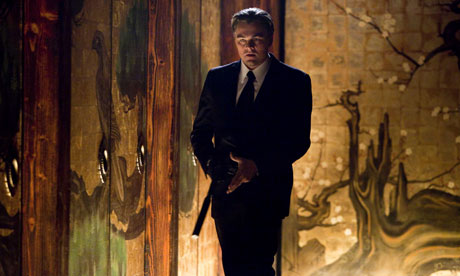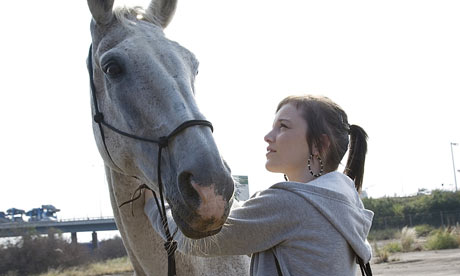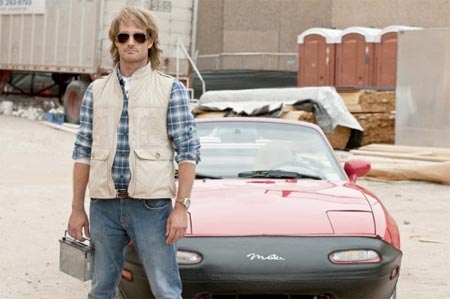 Warning: Do not read on unless you have actually seen "Inception." And even if you don't care about spoilers, I command you to proceed with caution.
Warning: Do not read on unless you have actually seen "Inception." And even if you don't care about spoilers, I command you to proceed with caution.So, here we are. "Inception" has officially been in theaters for two weekends. It's also been a little over a week since I first laid eyes on it and made it out to be a magnum opus unlike any we've ever seen (or, unlike any we've seen since Kubrick or Scorsese and Coppola in their prime). Since then, the film has made a killing at the box office, and has been called both an epic masterpiece and an overrated piece of crap.




Yes, many have dared to call "Inception" overrated. Others have dared to call it resistant to criticism. This just shows how no one seems to know what "Inception" really is. And let's hope it stays that way.
I am going to assume that most everyone who has decided to read this article has either already seen "Inception" or just doesn't care if anything gets spoiled at all. I will be light on the spoilers, but a little more specific than last time. I don't know if I'm qualified enough to write about "Inception" again. Even after seeing it again, and I feel like I understand a great deal more, I still feel like I know nothing. Yet "Inception" is just one of those movies you have to talk and write about as much as possible after viewing them.
It is safe enough to say that "Inception" has received an overwhelmingly positive response. Some make legitimate arguments. Others are just hating for the sake of being contrarian. Others are exposing everything that is wrong with modern film criticism.

It is not just one group of people who are causing the problems. The haters seemed ready to hate "Inception" since before it was even released. This goes even beyond Armond White, the now notorious critical contrarian. I won't spend too much time on White, but I will say that it's one thing to not like a movie because it is flawed, and another to not like it because you feel it has enough love already.
And then there are those people who think that "Inception" should be shielded from all criticism. These people seem to think just because it is so unique that nobody should be allowed to point to its problems. Well, everyone has a right to their opinion, and in a time where the art of film criticism is in danger, telling a critic to shut it seems kind of dangerous. As much as I love Rotten Tomatoes, I might have to blame this on them. There is a sort of feeling these days that if a movie doesn't receive a perfect 100%, then it is no good. Right now, "Inception" stands at 87%. Most movies would dream to have that much approval.
And then there are those people who think that "Inception" should be shielded from all criticism. These people seem to think just because it is so unique that nobody should be allowed to point to its problems. Well, everyone has a right to their opinion, and in a time where the art of film criticism is in danger, telling a critic to shut it seems kind of dangerous. As much as I love Rotten Tomatoes, I might have to blame this on them. There is a sort of feeling these days that if a movie doesn't receive a perfect 100%, then it is no good. Right now, "Inception" stands at 87%. Most movies would dream to have that much approval.
But enough with the triviality of reality. It's time to delve into the world of movies. Specifically, the world of "Inception." And what a world it is. Even on a second viewing, there was still something amazingly unique about it. While some movies that are full of surprises feel less surprising on a second viewing, "Inception" is still filled with new things.
If you've only seen "Inception" once, chances are you are really confused. It makes sense why anyone would be confused after just one viewing, but the funny thing is that no one should be. With a close listen to the dialogue, you can see that almost everything is totally spelled out for you. Almost every single line of the film is pure exposition. Yet, it seems even breezier and more fascinating on a second listen. Exposition can be fine if it's actually interesting.

I found on a second viewing that I was paying less attention the spectacle and more attention to the actual story. Yes, the folding city and zero gravity fighting are still awesome, but there's nothing quite like seeing scenes like that fresh. But when you look at the scenery, you really can miss the depth. Many have found "Inception" to be weakest in its story. That might be thought of in one viewing. But there really is more than meets the eye.
What really stood out now were the film's themes. The central question goes well beyond is this reality or a dream. It is more like when does reality start and subconscious set in, and vice versa. The question could even extend to whether or not one or the other doesn't even exist, or whether they exist in the same place.
This can be seen when paying very close attention to Mal (Marion Cotillard). She's more than just a projection, she is Cobb's totem. While Cobb is constantly spinning the top to see if he is dreaming or not, that was Mal's totem. In that sense, he doesn't use it so much to see whether or not he is in a dream, but whether or not he will get to see his wife again. Perhaps the reason he didn't even pay attention to whether or not the top was going to fall in the end was because he had totally let go of his wife. Whether or not she showed up was irrelevant.
In the relationship between Cobb and Mal lies the film's true heart. And while others didn't notice, it is beating. In addition, despite the fact that the scene where Fischer (Cillian Murphy) confronts his dying father was imagined, there was something extremely satisfying about the revelation reached at the end of it. Fischer, like Cobb, could not function on his own without getting rid of the weight of his troubled past. Dreams are where we go to escape our troubled pasts, and our even more troubled presents.

Something that is harder to notice is the film's very keen sense of humor. Most of the jokes are quick enough that only someone who has viewed the movie twice can really catch them. They also manage to work well in part of the actors. Tom Hardy as the forger Eames added a dry sense of playful British humor to every scene he was in.
But the second time around, one laugh I didn't expect came at the end. After waiting in anticipation to see the fate of the spinning top (even though I knew the ending, I was still at the edge of my seat), the whole audience began to laugh once the screen turned black. They weren't laughing at the movie, but rather with it. Perhaps Nolan actually intended that ending to be a sick joke. Maybe the moment the screen faded to black the top either fell or kept spinning.
Yes, that final shot is just one tiny shot. But it really needs to be discussed. It is more of a paradox than the infinite staircase. Yet, at that point, it almost didn't seem to matter whether or not Cobb was dreaming or awake at that point. The last shot was a sort of Schrodinger's Cat: the ending is both relevant and irrelevant at the same time.

The top is so important because this tiny toy encapsulates the whole point of the movie. Perhaps the most important line in the film is when Mal tells Cobb there are three options in life: what you believe, what you want to believe, and what you know is real. In the case of whether or not the top keeps spinning or collapses, I could say I believe that Cobb is in reality, I want to believe that Cobb is dreaming, and I know that it's impossible to ever know which one it actually is. Any of these three answers, even the one about what is real, can be altered in some way. Just like dreams have different meanings to different people, the whole of "Inception" can mean so many different things. By opening up the possibility to us that nothing we saw took place in reality, Nolan was in effect performing inception on the audience.
That leads to a theory that's been widely discussed and is extremely plausible: "Inception" is a metaphor for the act of filmmaking itself. Each person who serves a role could also serve on a film set. Both involve artists meticulously creating worlds from scratch and keeping them from falling apart.
For one more second, back to that ending. There is indeed proof of multiple conclusions. Notice how the light in Cobb's house shines in the same way it did when him and Mal woke up. Notice also that this time, his children turned around while in his dreams they never did. Then again, maybe that's because he never bothered looking in his dreams.
So maybe it is too early to call "Inception" one of cinema's greatest. "Citizen Kane" wasn't called the best film in 1941. I'm not saying "Inception" has quite the impact on filmmaking as "Citizen Kane" did. But I do know that it will forever effect the way I watch and process film. It truly did push boundaries both visually and narratively. It simultaneously achieved mirror-breaking self-reflexiviness and it also became an allegory for the world we live in. I don't think I'm over-analyzing when I say that "Inception" reflects a world where people are more interested in creating their own worlds than fixing the one they actually live in.
Now, who here is ready for round three?



















